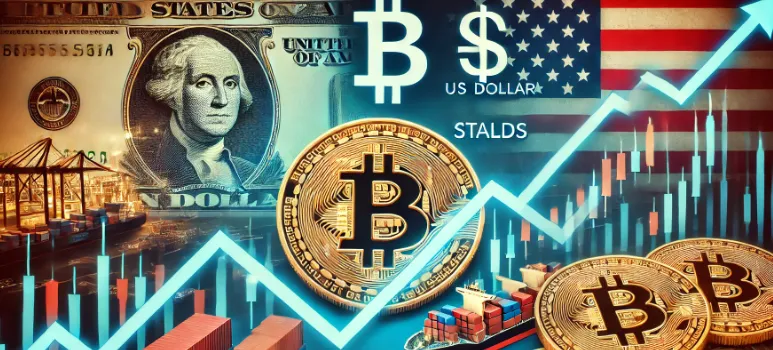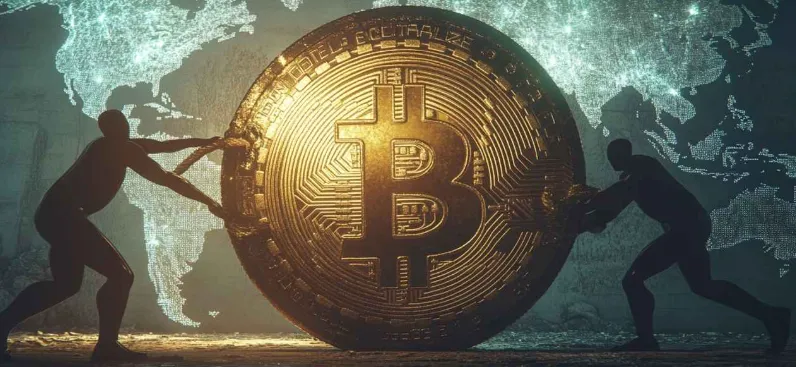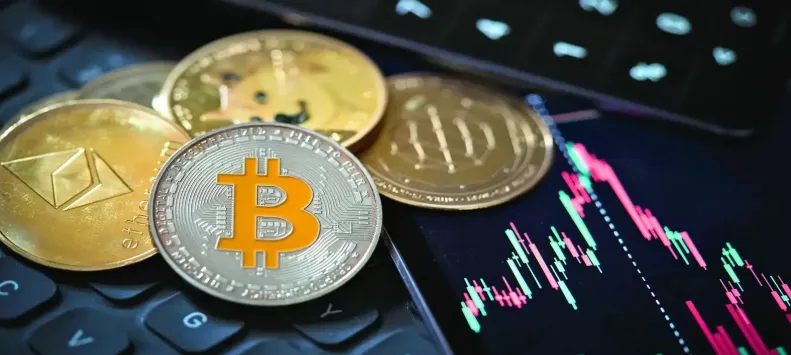Bitcoin Might Rise Despite Global Trade War Tensions
Bitcoin may still find room to soar even as the ongoing US-China trade war escalates. Despite hopes for a diplomatic breakthrough, the White House has confirmed that 104% tariffs on Chinese imports would begin on April 9. Market optimism quickly turned to concern after White House trade adviser Peter Navarro bluntly stated that the tariffs were “not a negotiation.”
Following this news, the S&P 500 index dropped 1.6% on April 8, reversing earlier gains and sparking fears about worsening macroeconomic conditions. Crypto traders are left wondering if Bitcoin can retain its bullish outlook in this increasingly hostile environment.

S&P 500 Plummets While Bitcoin Seeks Stability
Between April 2 and April 7, the S&P 500 index lost 14.7%, sparking panic across markets. Bitcoin, in response, retreated to $75,000 — its lowest point in over five months. The correlation between crypto and equities proved persistent, leaving many wondering whether Bitcoin could regain strength.
In a press appearance alongside Israeli Prime Minister Netanyahu on April 7, President Donald Trump declared that the current tariffs could be permanent, but negotiations were still possible. He emphasized that the US needed broader changes beyond just tariff adjustments, signaling a deeper and longer-lasting trade conflict.
These tensions have already begun affecting corporate activity. IPOs, mergers, and bond sales have been postponed, while leveraged loans are being put on hold, according to Yahoo Finance. It’s clear that equity markets could rebound if geopolitical risk were to subside — but that’s a big “if.”
Bitcoin as a Hedge Against Inflation and Fiscal Crisis
While stocks may struggle in a prolonged trade war, Bitcoin could benefit. Many investors view its fixed supply and decentralized nature as a hedge against fiat currency devaluation. Unlike fiat money, Bitcoin isn’t subject to monetary expansion, which is why some see it as a long-term safeguard in turbulent times.
Rising US debt levels reinforce this narrative. On April 8, US 10-year Treasury yields jumped to 4.28%, after dipping to 3.90% the day before. Higher yields suggest that investors are demanding better returns to hold government debt, reflecting growing fiscal concerns.

Dollar Weakness and Treasury Yields Signal Trouble
The US Dollar Index (DXY) fell from 104.2 on March 31 to 103.0 on April 8, even as Treasury yields rose. This divergence hints at market confusion and growing expectations of dollar weakness. As the cost of servicing $9 trillion in federal debt due over the next year rises, the US could be forced to take drastic measures — a possible bullish signal for Bitcoin.
This view was echoed by BlackRock CEO Larry Fink, who highlighted Bitcoin’s appeal amid rising inflation fears and weakening fiat systems. Some analysts now believe Bitcoin may benefit from ongoing financial instability, as investors look for scarce, non-sovereign assets.
Interest Rate Policy Adds More Uncertainty
Although Bitcoin often moves in sync with equities in the short term, its longer-term trajectory could diverge. Morgan Stanley’s chief US economist, Michael Gapen, recently noted that the Federal Reserve may hold rates steady until at least March 2026, unless a recession forces earlier cuts.
According to CNBC, Morgan Stanley projects the Fed will maintain rates at 4.25%–4.50%, unless economic growth deteriorates significantly. In that case, they expect not only earlier cuts but larger initial reductions in interest rates.
If inflation resurfaces during this waiting period, Bitcoin could become increasingly attractive to investors seeking inflation protection. The Fed’s limited maneuvering room could enhance Bitcoin’s role as a hedge.

The Bigger Picture: Can Bitcoin Escape the Chaos?
Although predicting short-term price movements remains difficult, macroeconomic stress may ultimately benefit Bitcoin. As fears about the US dollar’s value mount and fiscal imbalances deepen, investors may increasingly look to Bitcoin as a safe alternative — especially if the trade war drags on without resolution.
Even without a breakout in the immediate future, the underlying narrative continues to strengthen: in times of uncertainty, Bitcoin’s scarcity, independence, and resistance to manipulation could turn it into a preferred store of value.